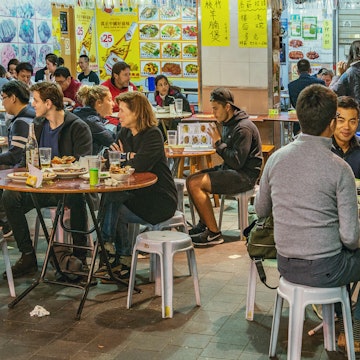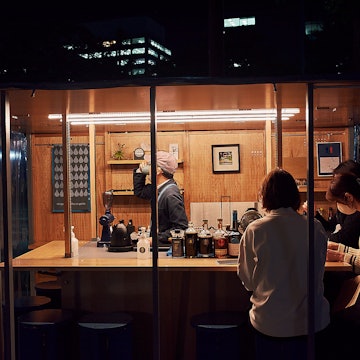
🌍 Help Me, LP! How do I manage my period on a lengthy and remote trip?

Jan 6, 2023 • 5 min read

While everyone’s period experience varies enormously, these tips will help you get the most out of your journey © Getty Images
In this series, Lonely Planet’s team of writers and editors answers your travel problems and provides tips and hacks to help you plan a hassle-free trip. A question about planning travel around your menstrual cycle prompted this thoughtful response from multi-continental Lonely Planet correspondent Tasmin Waby.
Question: I’m 23 and planning an extended trip later this year to Asia, visiting some pretty remote places. Someone advised I should pack enough sanitary products for the duration of my trip. Is this true?
Tasmin Waby: Periods are a messy fact of life for many of us travelers. Yet while everyone’s menstruation experience varies enormously, keeping a few tips and best practices in mind will help you get the most out of your journey, no matter how your own cycle works.
First, do your best to predict when you’re going to bleed. One of the great freedoms of traveling is not having to pay attention to the date or the day of the week, and a week of new life experiences can fly by in a whirlwind of adventure. Yet for reasons many of us can understand, some days can drag on like a rainy weekend at the beach.
There are plenty of apps to track your period, and you might very well have one already. If so, turn on push notifications and thus remove the need to check it. Period tracking is also handy for knowing when you’re going to be at your energetic best (usually around ovulation, at least in my case) for planning hikes, rafting and other high-octane activities.
Taking things easy and scheduling some downtime in the luteal phase of your cycle is always a good plan – as is eating magnesium, calcium and protein-rich foods that can help balance your hormones, reduce bloating and keep those cravings at bay. (Still, I always have emergency dark chocolate packed in my bag, just in case.)
Tracking your period also helps you keep abreast of your menstrual health while you’re on the road. Any change in your regular cycle, from delayed periods to mid-cycle bleeding, may warrant further investigation.
Once you’re aware of when your period is due, there’s the issue of dealing with menstrual blood in a new environment. Luckily, these days we are spoiled with options for mopping up.
Before we talk about tampons and the like, I suggest watching Jen Gunter’s TED talk “Why can’t we talk about periods?” right away. It’s also important to note that in Southeast Asia (as in many other countries in the world) periods are still a taboo topic. Luckily, women like Minh Ngoc, founder of Green Lady Vietnam, have been working on changing this.
So… what do you do about your period when traveling in Southeast Asia?

You can indeed pack months’ worth of disposable period products in your backpack. They’ll take up a fair bit of room, but if you’re very attached to a particular brand of applicator tampon or a maximum-absorbency night-time sanitary pad with all the bells and whistles, I hear you.
You can also buy tampons and pads when you’re in major cities in Asia – yet expect the pads to be thin and cardboard applicators non-existent.
Disposing of these products can also be tricker: you won’t see discrete bins in public toilets. Sometimes, depending on how remote you go, you’ll be lucky to find even toilet paper (be sure to BYO “bog roll”) or soap (carry hand sanitizer, too).
Rather than tampons, many women now use silicone cups, which you empty every four hours or so depending on your flow. According to Mooncup, you might go through a grand total of 11,000 disposable period products over your menstrual years. Clearly, getting on board with reusable sanitary products is the kinder way forward for the environment – and your wallet, too.
I always wash or disinfect my hands before playing around with my private parts (hence that BYO hand sanitizer). If I can, I give my Mooncup a rinse if there’s a tap near the toilet. If not, a good shake and a wipe with some toilet paper is usually sufficient before reinserting.
I have to admit that it took me quite a few months of using a cup before I felt fully comfortable with it. At first I only used it at home, and remained taking disposable products out and about. I found different public toilet setups hard to face when I was still getting comfortable with the cup. So if it’s a new thing for you, try to get some practice and build up confidence before you head overseas.

Next: period underwear. What a game changer!
These are perfect for traveling because you can wash them in cold water and dry them overnight. You’ll find multiple brands, styles and levels of absorbency out there. Pro tip: because I live on a budget, I used to buy cheaper brands – but beware of serious VPL issues. I have since upgraded to higher-end designs, which I’ve found soft and seamless. I’ve also tended to choose brighter colors to help me distinguish them from my usual knickers in my bedroom drawer – and in my luggage.
Finally, you can’t beat reusable pads when traveling on your period. On my heavier days I need to change my pad quite often, and I worry my period underpants won’t be up to the task, so I save those for my lighter-flow days.
Reusable pads are easy to discreetly store in your bag. You can button and wrap them up, then take them home to wash at night. They’re smaller and quicker to dry, too. I also love the designs of most of the reusable pads I have bought over the years.
While this might sound a bit bonkers, the patterns and colors of different reusable pads bring me a slither of sparkly joy, when I’m otherwise feeling just a little bit put out with the fact that I have to deal with my period…again. But I am also learning to embrace some monthly downtime.
Good luck out there.













